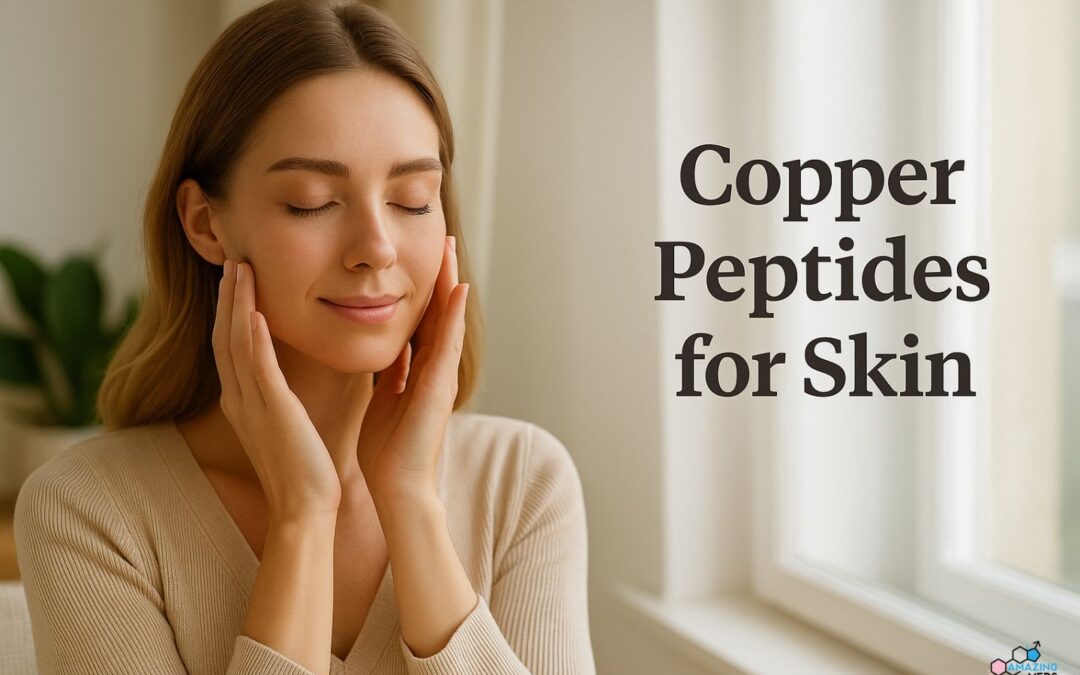Copper peptides have gained steady popularity in skin health, especially among those seeking targeted, evidence-backed solutions for aging, inflammation, and repair. Although often grouped with more mainstream peptides, copper peptides offer distinct biological functions and mechanisms of action.
Let’s explore everything you need to know before considering copper peptides as part of your skin therapy plan.
What are copper peptides and how do they work?
Copper peptides are small protein fragments naturally found in the human body, particularly in plasma, saliva, and urine. The most studied form is GHK-Cu, a tripeptide made up of glycine, histidine, and lysine bound to a copper ion.
This complex plays several biological roles, but in skin health, its primary actions include:
- Activating wound healing
- Stimulating collagen and elastin production
- Promoting angiogenesis (formation of new blood vessels)
- Modulating inflammation
- Acting as an antioxidant
Unlike standard skincare peptides, copper peptides do more than just signal collagen production. Their activity affects the extracellular matrix, skin remodeling, and even DNA repair mechanisms. Because of this broad action profile, copper peptides are often included in advanced medical-grade skin rejuvenation treatments.
What are the main skin benefits of copper peptides?
Promotes firmer, tighter skin
Copper peptides boost fibroblast activity, which helps increase collagen and elastin levels. This process supports stronger skin structure, leading to improved firmness and elasticity over time.
Reduces fine lines and wrinkles
As collagen production increases, skin becomes smoother and less creased. GHK-Cu also promotes glycosaminoglycan synthesis, which improves hydration and skin volume. This reduces the appearance of both dynamic and static wrinkles.
Enhances wound healing and reduces scarring
Copper peptides are particularly effective in accelerating tissue repair. Clinical studies have shown faster wound closure and reduced scarring in both superficial and deeper skin injuries. This makes them valuable in post-procedure recovery, such as after microneedling or laser treatments.
Improves skin tone and texture
Copper peptides support even pigmentation by reducing inflammation and oxidative stress that can lead to discoloration. Many users notice a more balanced skin tone and a smoother surface within several weeks of consistent use.
Protects against oxidative stress
As a potent antioxidant, GHK-Cu binds free radicals and prevents lipid peroxidation. This defense helps slow the visible effects of aging caused by environmental stressors like UV radiation and pollution.
Are there any side effects or risks with copper peptide use?
Copper peptides are generally well-tolerated in topical or injectable forms when used as directed. However, like any active agent, there are some potential side effects to be aware of:
Common side effects
- Mild skin irritation or redness, especially with new users
- Temporary tingling or sensitivity
- Dryness or flaking when combined with certain exfoliants
These effects are usually short-lived and resolve as the skin adapts. Choosing medical-grade products and personalized dosage helps minimize these issues.
Rare or misuse-related effects
Overuse of copper peptides can disrupt the natural copper balance in skin cells. Excess copper may lead to:
- Pro-oxidant activity (causing oxidative stress instead of preventing it)
- Skin sensitivity or inflammation
- Possible acne flare-ups if combined with pore-clogging formulations
For this reason, it is essential to follow a protocol designed by a licensed provider.
What are the best forms of copper peptides for skin?
The ideal delivery method depends on your skin goals, tolerance, and treatment setting. Below are the most common and effective forms available:
Topical serums
These are the most widely used and easiest to apply. Medical-grade GHK-Cu serums typically contain concentrations between 0.1% and 2%. They are often recommended for anti-aging maintenance, post-treatment healing, and general skin revitalization.
When choosing a serum, avoid those that include harsh preservatives, strong acids (like glycolic acid), or unstable vitamin C formulations, as these may destabilize the copper peptide.
Microneedling with copper peptides
Microneedling increases absorption and enhances results by creating micro-channels in the skin. Applying copper peptides immediately after microneedling allows deeper penetration and faster healing.
This treatment is most effective under medical supervision to control dosage, needle depth, and sterility.
Injectable copper peptide therapy
Injectable GHK-Cu offers the highest bioavailability. This route is preferred for individuals with deeper skin damage, slow wound healing, or those undergoing regenerative protocols.
Injections are typically administered in-clinic by a licensed provider and may be combined with other peptides or platelet-rich plasma for synergistic effects.
Compounded prescription formulations
Custom-compounded peptide therapies allow exact dosage control and formulation adjustments based on individual needs. This ensures safety, stability, and optimal results, especially for patients with allergies or sensitivities to commercial skin care products.
How should copper peptides be integrated into a skin care routine?
Copper peptides can be used daily, but how they are integrated depends on delivery method and other products being used.
Basic application tips:
- Apply to clean, dry skin. Wait at least 15 minutes after cleansing.
- Do not layer with strong acids or vitamin C. This can destabilize the copper and reduce effectiveness.
- Use at night. Skin regeneration is more active during sleep, making nighttime ideal.
- Introduce slowly. Start with every other night and build up based on tolerance.
For injectable or compounded therapies, your provider will guide the dosage frequency and monitor progress. These forms are not meant for daily self-application unless prescribed.
How does copper peptide therapy compare to other peptides?
Copper peptides work differently from more common peptides like Matrixyl or Argireline. While those mainly target surface-level wrinkles or hydration, copper peptides affect multiple layers of the skin and trigger repair functions beyond collagen synthesis.
In regenerative medicine, they are often used alongside:
- BPC-157 for wound healing
- Epithalon for anti-aging
- GHK-Cu with growth hormone therapies for skin and tissue recovery
Resources
- https://pubmed.ncbi.nlm.nih.gov/14648529/
- https://pmc.ncbi.nlm.nih.gov/articles/PMC4556990/
- https://pmc.ncbi.nlm.nih.gov/articles/PMC3016279/
- https://pmc.ncbi.nlm.nih.gov/articles/PMC6073405/
- https://www.liebertpub.com/abs/doi/10.1001/archfaci.8.4.252
- https://www.cir-safety.org/sites/default/files/tripep062014final.pdf

